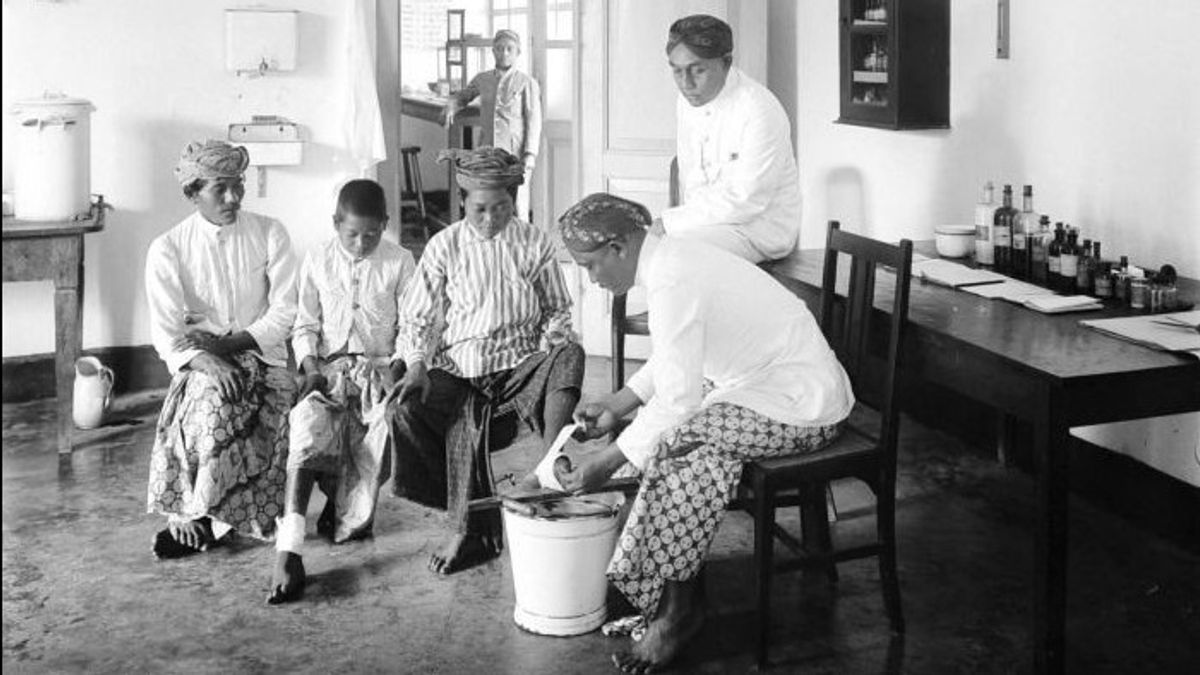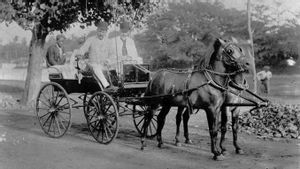JAKARTA - The Javanese Doctor School is the source of resistance against the plague. The graduates are so special. They have the title Doctor of Java, sometimes also known as medical doctors. The mantri is the key to a successful fight against the plague. Primarily bubonic and smallpox. From there, their big role is sometimes not worth the salary they receive. The salary they receive is modest, if you don't want to say it's small. Moreover, they often face discrimination in the public sphere.
Along the way, the Javanese Doctor School was founded by the Dutch colonial government in 1851. The lack of health workers willing to fight against the plague to remote villages was the reason for its formation. Gradually, the Javanese Doctor School became known as School Tot Opleiding Van Inlansche Artsen (STOVIA). Then people recognized STOVIA as the "womb" that gave birth to the actors of the Indonesian national movement.
Apart from producing critical graduates, such as Mas Wahidin Sudirohusodo, Tjipto Mangoenkoesoemo, and Soetomo, STOVIA has also produced many reliable health workers. The role of Doctor Djawa to help curb the spread of the plague was recognized by the colonial government itself. Their way of working is considered effective, even though they are far less prestigious than European doctors and graduates of OSVIA - a school for candidates for government employees.
“After finishing school, STOVIA graduates, especially those from the Javanese Doctor School - STOVIA before 1900 - have never been able to get the socio-economic rewards they hoped for. Until the early 20th century, the position of Doctor of Java in government was considered the same as the position of mantri. Their main role as vaccinators does not generate respect as well as OSVIA graduates who work in indigenous administrative posts, "wrote Yudi Latif in the Cultural Education book (2020).

Nevertheless, Doctor Djawa continued to prove himself. Cultural reasons and emotional closeness are the reasons why native people only want to be vaccinated by the pox mantri. Therefore, the model and pattern of colonial government policies in dealing with smallpox were applied to treat other diseases, such as cholera and malaria. Again, it was Doctor Java who came directly.
We have reviewed in more detail regarding the role of the Javanese doctor in the article "The Key to Successful Smallpox Vaccination in the Dutch Period is in the Hands of the Health Mantri".
"Even though there is no compulsory vaccination program in the Dutch East Indies, the Medical Service has tried as much as possible to do it in a careful and systematic manner. Each village is visited once every 7 years by a competent vaccine expert. The population is gathered with the help of civil servants, then vaccinated en masse, over a span of several days. The same special inspection trip is carried out for infant vaccination, ”explained Dr. J. Stroomberg in the book Dutch East Indies 1930 (2018).
Low wages and discriminationOn paper, the presence of Stovia graduates against the plague is vital. Those who work in the field do not receive a living wage. Moreover, they often faced discrimination from the Dutch. Even if they received a Western education, they should not look like Westerners, especially in terms of appearance. School regulations stipulate that, except for Christians, young people (STOVIA graduates) are prohibited from wearing jackets and pantalons.
"They can get a Western education, but they can't look like Westerners. They are not called full 'doctors'. They were just 'Indian doctors' or 'Javanese'. Their salaries in government and plantation services were much lower than that of the Dutch doctors. When traveling, they are not allowed to take the class I train. Meanwhile, Europeans with lower education can sit there, ”said Goenawan Mohamad in his writing in Tempo Magazine entitled Blangkon (2009).

Not only Goenawan Mohammad. The book published by the Directorate General of Indonesian Culture, entitled The History of the National Awakening of the East Java Region (1978), reveals the same thing. Doctor Djawa when traveling by train, even at state expense, is only allowed to use class III. In the class system on the Dokter Djawa train, it is equal to coolies and prisoners.
Back to the subject of salary. Generally, Doctor Djawa's salary is between 30 and 50 guilders a month. If they were placed in a hospital, they got an additional 10 to 15 guilders in housing costs. In addition, they were given a medicine chest and a number of tools for use in medical practice.
Senior journalist, Rosihan Anwar, even recounted the plight of a Javanese doctor, Raden Soekardie. In the book Small History of Indonesia's "Petite Histoire" Volume 3 (2009), Rosihan reveals that the incident of a Javanese doctor being transferred to another place, is a ruin for them. With a measly salary, it often takes the doctor (Soekardie) to travel several days before arriving at his new place.
"There was a time when I had to live on 7.5 guilders (rupiah) a month after being transferred," said Doctor Raden Soekardie.
The 7.5 guilders were the remainder of Soekardie's 90 guilders salary. This was because Soekardi had taken one month's salary. He had to be paid back in four payments or 22.5 guilders a month. In addition, his place of work is quite far from the capital city of Afdeling, which has not many inhabitants. There, there is a governor's hospital for bumiputra which must be visited twice a day.
“I rent 30 guilders a month, expensive for my salary, but because there is nothing else I have to rent. For transportation, at that time I used a cikar-veer, a two-wheeled vehicle, a kind of wagon or sado. The rent was 30 guilders a month because the driver of the carriage didn't want to give a discount. So, count 22.5 guilders plus 30 guilders altogether to be 82.5 guilders. The remaining 7.5 guilders, "closed Raden Soekardie, quoted by Rosihan Anwar.
The English, Chinese, Japanese, Arabic, and French versions are automatically generated by the AI. So there may still be inaccuracies in translating, please always see Indonesian as our main language. (system supported by DigitalSiber.id)









